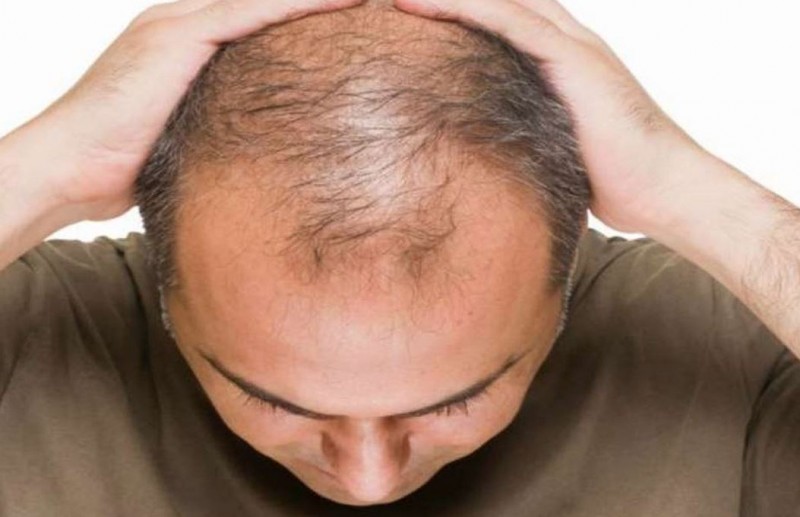
Baldness in men, also known as androgenetic alopecia or male pattern baldness, is a condition where men begin to experience hair loss. This issue is often attributed to genetic or hormonal changes. The primary cause of baldness in men is considered to be a combination of genetic trends and the impact of dihydrotestosterone (DHT), a hormone that binds to receptors in the hair follicles. In individuals with genetic predispositions, DHT can shrink the hair follicles, causing them to weaken and leading to thinning and shedding of hair. While genetics play a significant role, several other factors can also influence male baldness. Let's explore all these factors in detail.
Medications: Some medications prescribed for various health conditions, such as cancer, high blood pressure, depression, and arthritis, may have the adverse effect of causing hair loss. Certain drugs, including chemotherapy agents, beta-blockers, and antidepressants, can disrupt the normal hair growth cycle and lead to significant hair shedding. Understanding the potential side effects of these medications and discussing alternatives with a healthcare provider can help manage hair loss risks.
Hormonal Imbalance: Hormones play a crucial role in regulating various bodily functions, including hair growth. Imbalances in hormone levels, especially an excess of dihydrotestosterone (DHT) or changes in thyroid hormones, can contribute to male pattern baldness. Increased DHT levels can lead to the shrinking of hair follicles and subsequent hair thinning and loss. Hormonal therapies and treatments aimed at restoring hormonal balance can help mitigate hair loss.
Age: As men age, hormonal fluctuations and changes in the body's physiology can affect hair health. Testosterone levels tend to decrease with age, which can impact the hair growth cycle. The gradual decrease in testosterone can lead to the miniaturization of hair follicles, making hair thinner and more susceptible to shedding. Additionally, the aging process affects the overall health of the scalp, making it essential to use age-specific hair care products and techniques to maintain healthy hair.
Nutritional Deficiencies: A well-balanced diet rich in essential vitamins, minerals, and nutrients is vital for maintaining healthy hair. Deficiencies in key nutrients such as vitamins A, C, D, E, biotin, and iron can contribute to hair thinning and loss. Vitamin A promotes the production of sebum, an oily substance that conditions the scalp. Vitamin C aids in collagen production, necessary for healthy hair structure, while vitamin D is crucial for hair follicle cycling. Vitamin E is an antioxidant that can help reduce oxidative stress in the scalp. Biotin, a B-complex vitamin, is essential for the production of keratin, a key structural component of hair. Iron is crucial for proper blood circulation and the supply of oxygen to the hair follicles. Maintaining a nutrient-rich diet can significantly contribute to healthy hair growth and prevent the risk of baldness.
Stress: Psychological stress can have a profound impact on overall health, including hair health. Chronic stress can disrupt the normal hair growth cycle, leading to increased hair shedding and a condition known as telogen effluvium. Stress can also trigger underlying scalp conditions such as alopecia areata, an autoimmune disorder that causes patchy hair loss. Implementing stress management techniques such as meditation, yoga, and regular exercise can help alleviate stress and potentially reduce the risk of hair loss.
Medical Conditions: Several medical conditions can contribute to hair loss in men. Autoimmune diseases such as alopecia areata and lupus can cause hair loss by mistakenly attacking the hair follicles. Scalp infections, such as ringworm, can lead to scaly patches and hair breakage. Additionally, treatments like chemotherapy, commonly used for cancer, can result in widespread hair loss due to their impact on rapidly dividing cells, including hair follicles. Managing these underlying medical conditions through appropriate treatment and consulting a healthcare professional can help prevent and manage hair loss effectively.
Smoking: Smoking not only poses significant risks to overall health but also has adverse effects on hair health. The harmful chemicals in tobacco smoke can constrict blood vessels and reduce blood flow to the hair follicles, leading to poor nutrient delivery and oxygen supply to the scalp. Additionally, smoking can increase oxidative stress, which can damage hair follicles and accelerate hair aging. Quitting smoking and adopting a healthy lifestyle can significantly improve overall health and reduce the risk of hair loss.
These factors, along with genetics, contribute to the problem of baldness in men. Understanding these causes can help individuals take preventive measures and make informed choices for their hair health.
Menopause Emerges as a Significant Risk Factor for Heart Disease: Study
Mental Hai Kya Becomes Judgmental Hai Kya Amid Controversy
Do you ever put the old charger in the new phone? Know the disadvantages